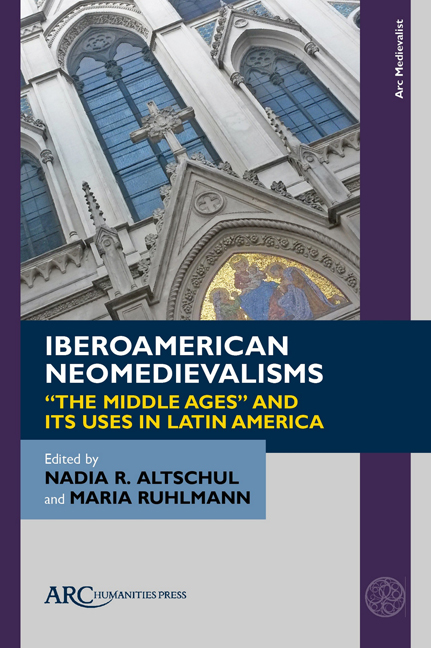Book contents
- Frontmatter
- Contents
- List of Illustrations
- Chapter 1 Postcolonizing Neomedievalism:An Introduction
- Chapter 2 The Criollo Invention of the Middle Ages
- Chapter 3 A Militant and Peasant-Based Medieval History in Brazil: Fanning the Spark of Hope
- Chapter 4 Neomedievalism and the Hagiography of Valdemiro Santiago: Neopentecostal Sanctification
- Chapter 5 The “Middle Ages” in the Brazilian Presidential Elections of 2018: The Left, the Right, and the Centre
- Chapter 6 Averroes in Mid-Colonial and Inter-Imperial Cordoba
- Chapter 7 Hypermedievalizing and De-Medievalizing Dante: Leopoldo Lugones’s and Jorge Luis Borges’s Rewritings of Inferno V
- Chapter 8 Borges and Kennings
- Chapter 9 Memory, Desire, and Sexual Identity in Manuel Mujica Lainez’s El unicornio
- Chapter 10 Rewriting and Visualizing the Cid: The Reconstruction of Medieval Gender and Race in Argentinian Graphic Novels
Chapter 7 - Hypermedievalizing and De-Medievalizing Dante: Leopoldo Lugones’s and Jorge Luis Borges’s Rewritings of Inferno V
Published online by Cambridge University Press: 18 November 2023
- Frontmatter
- Contents
- List of Illustrations
- Chapter 1 Postcolonizing Neomedievalism:An Introduction
- Chapter 2 The Criollo Invention of the Middle Ages
- Chapter 3 A Militant and Peasant-Based Medieval History in Brazil: Fanning the Spark of Hope
- Chapter 4 Neomedievalism and the Hagiography of Valdemiro Santiago: Neopentecostal Sanctification
- Chapter 5 The “Middle Ages” in the Brazilian Presidential Elections of 2018: The Left, the Right, and the Centre
- Chapter 6 Averroes in Mid-Colonial and Inter-Imperial Cordoba
- Chapter 7 Hypermedievalizing and De-Medievalizing Dante: Leopoldo Lugones’s and Jorge Luis Borges’s Rewritings of Inferno V
- Chapter 8 Borges and Kennings
- Chapter 9 Memory, Desire, and Sexual Identity in Manuel Mujica Lainez’s El unicornio
- Chapter 10 Rewriting and Visualizing the Cid: The Reconstruction of Medieval Gender and Race in Argentinian Graphic Novels
Summary
Dante's Divine Comedy is widely considered to be one of the most emblematic works of the Middle Ages—a work that seemingly encompasses the medieval worldview in its depiction of the afterlife and whose influence reverberated through the centuries and, geographically, far beyond Western Europe. In this chapter, I examine two twentieth-century Argentine adaptations of one of the most famous episodes of the Comedy—the story of Francesca da Rimini in Canto V of Inferno. Both Leopoldo Lugones and Jorge Luis Borges, two authors intent on developing Argentine national literature, wrote innovative adaptations of the tale. While Lugones accentuates and romanticizes everything medieval in his version, Borges eliminates medievalisms entirely by setting the tale on the Argentine pampas in the nineteenth century. I will discuss their individual motives for choosing to embrace or reject medievalisms in their rewritings of the Francesca episode in relation to their ideas on how to develop a uniquely Argentine literature.
Before beginning, let us recall some details of Dante's version of the story. We encounter Francesca and her lover Paolo (who remains unnamed) in the second circle of hell where the lustful are blown about by violent winds in punishment for their inability to control their passions. Francesca and Paolo in particular are guilty of adultery, although Dante does not explain to us the exact circumstances, which the reader is assumed to know—that Francesca was married to Giovanni Malatesta (“Gianciotto,” or “crippled John”) circa 1275, that she committed adultery with Paolo Malatesta, and that she and Paolo were both murdered by Gianciotto, most likely in the 1280s. Dante tells us only that Francesca was born where the river Po meets the Adriatic, that she and her lover are related by marriage, and that their killer will be punished in Caina (a place in lower hell named after Cain, who slew Abel) following his death. The focus of the episode is on their unbridled love for one another and their consequential suffering in the afterlife. Francesca, with great rhetorical skill, tells the story of how they fell in love, seeking to win her auditor's compassion. There are no details or place descriptions that might lead us to locate the story in the Middle Ages, other than the fact that the two lovers succumbed to their lust while reading the story of Lancelot.
- Type
- Chapter
- Information
- Iberoamerican NeomedievalismsThe Middle Ages' and Its Uses in Latin America, pp. 121 - 138Publisher: Amsterdam University PressPrint publication year: 2023



